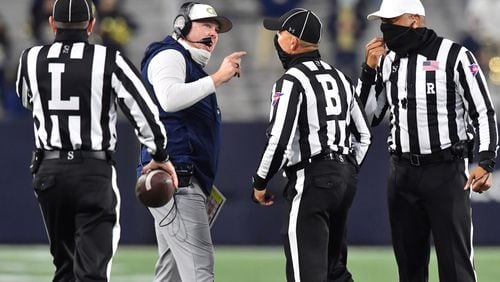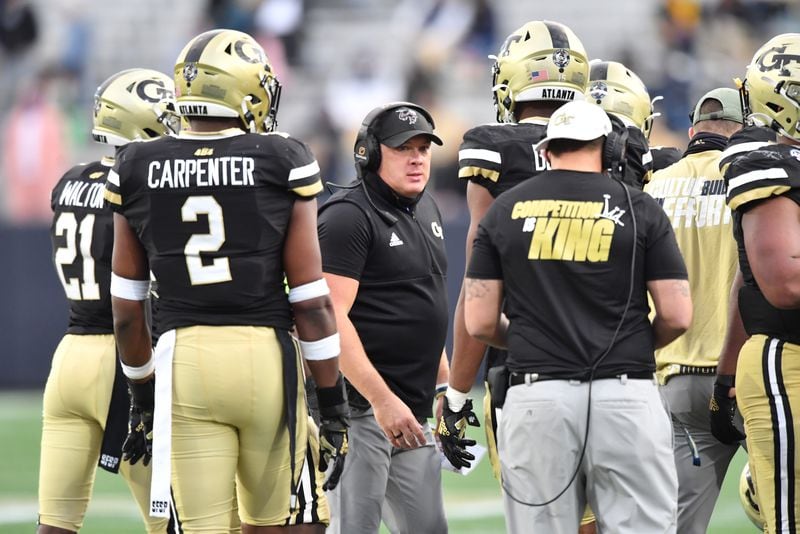All of Georgia Tech’s weaknesses showed up in what turned out to be its final football game of 2020. The Yellow Jackets struggled to pass, their thin defense wilted and coach Geoff Collins raged against game officials as his team was called for an assortment of major penalties.
Tech was flagged for three personal fouls and two roughing penalties during its 34-20 loss to Pitt on Thursday at Bobby Dodd Stadium. Those were among Tech’s eight penalties for 86 yards, which is about average for the Jackets this season. It’s also the norm for Collins, whose teams have piled up penalties in half his four seasons as head coach.
The Jackets were 3-9 in 2019 and are 3-7 this season. I believe they’ll be better in Collins Year 3. But they won’t reach their full potential if Collins can’t get them to constantly stop hurting their cause with penalties. It happened at Temple in 2018, and it happened with Tech this year.
By now you know that it was a major endeavor for Tech to move on from Paul Johnson’s Tech triple-option team to a modern spread. If you don’t know, Collins is happy to remind you again that he inherited a unique rebuilding job. But Collins also took over a team that didn’t commit many penalties.
In 2018, only one FBS team drew fewer flags than Tech and just three averaged fewer penalty yards per game. In 2017, the Jackets had fewer penalties and penalty yards per game than all but 10 teams. In Year 1 with Collins, Tech had the fourth-fewest penalties and average penalty yards in FBS.
In Collins Year 2, the Jackets are tied with N.C. State for the most penalties in FBS despite playing one less game. Tech’s 74.9 penalty yards per game are 12th-most in FBS this season. Temple saw a similar trend with penalties when Collins coached the Owls in 2017 and 2018.
In 2016 with Matt Rhule (now coach of the NFL’s Panthers), Temple had fewer penalty yards per game than all but 20 FBS teams and ranked 46th in penalties committed. The Owls also weren’t penalized much in 2017. In 2018, Collins Year 2, only nine teams had more penalty yards per game than Temple, and eight had more penalties.
You see the pattern. Collins is hired to coach programs with a recent history of committing few penalties. That holds in Year 1. In Year 2, as Collins puts more of his stamp on the program, his teams start committing a lot of penalties.
That’s not to say coaching is to blame for all penalties. Sometimes physically overmatched teams draw a lot of flags. Offensive linemen hold defenders they can’t block. Defensive backs grab receivers they can’t cover. Those things happened plenty with Tech this season.
But fouls that have less to do with physical ability also were a major problem for the Jackets. Those are the penalties for late or illegal hits, unsportsmanlike conduct and false starts. They have more to do with a lack of discipline or focus. Tech had a higher rate of them in Collins Year 2.
According to my review of official play-by-play data, in 12 games last season Tech was called for nine personal fouls, two unsportsmanlike-conduct penalties, 16 false starts and zero roughing penalties. In 10 games this season, the Jackets had 14 (!) personal fouls, two unsportsmanlike penalties, 28 (!!) false starts and five roughing penalties.
The spike in those penalties was a return to form for a Collins-coached team. In 13 games in 2018, Collins’ Temple team was flagged 14 times for personal fouls, 10 times for unsportsmanlike conduct, three times for roughing and 20 times for false starts. That Temple team went 8-5, but Tech isn’t good enough to win in the ACC while drawing so many flags.
Credit: HYOSUB SHIN / AJC
Credit: HYOSUB SHIN / AJC
Collins doesn’t help matters with his public posture on penalties, both during games and after. All coaches complain about refs. Sometimes they even have a point (some questionable calls went against Tech vs. Pitt). But Collins can get to the point where he seems to be making a cause out of calls that he doesn’t like.
Griping about them was a regular feature of his postgame media sessions this season. Or, I should say that Collins let his silence on questions about calls do the talking. When Collins did comment on calls, he did it indirectly with conspiratorial-sounding references to things happening that were out of Tech’s control.
Sometimes his players fill in the blanks. After the Pitt loss, linebacker David Curry suggested that Tech always gets the short end from officials. Tech’s players clearly are getting Collins’ message about displeasure with game officials. It’s less evident that they are learning how to avoid dumb penalties.
Tech’s grumbling about calls might play well with supporters who feel the same way. I don’t see how it helps the Jackets play winning football. How can Collins tell his players to brush off bad calls when he can’t seem to do it? If the coach is pointing a finger at the refs, then so will the players. A team that’s preoccupied with calls is focused on the wrong thing.
It’s easy to see that Collins is an ultra-competitive, high-energy coach who wants his charges to play with an edge. But that attitude is detrimental if it causes Tech’s players to draw flags for getting too chippy. It was embarrassing for Tech when it led to Collins brushing off the postgame handshake with Pitt coach Pat Narduzzi.
That game became a sour ending to Tech’s season. The Jackets were forced to cancel their final scheduled game against Miami because COVID-19 and injuries made their numbers too thin. The Jackets won’t be going to a bowl even though they could have been considered under this season’s altered eligibility rules.
There are reasons to think Tech is on the come. Recruiting tops the list. Two freshmen, quarterback Jeff Sims and running back Jahmyr Gibbs, rank among Tech’s best players. Collins has a history of fielding good defenses, so I have little doubt that side of the ball will get better for Tech as the depth improves.
The Jackets won’t ever have as many good players as the ACC’s top programs. Yet Collins already owns victories against two league foes that recruit at a higher level, Miami and Florida State. The Jackets can earn more upsets, and avoid losses to the likes of The Citadel and Syracuse, if Collins can get his team to play with more discipline and fewer penalties.
About the Author








